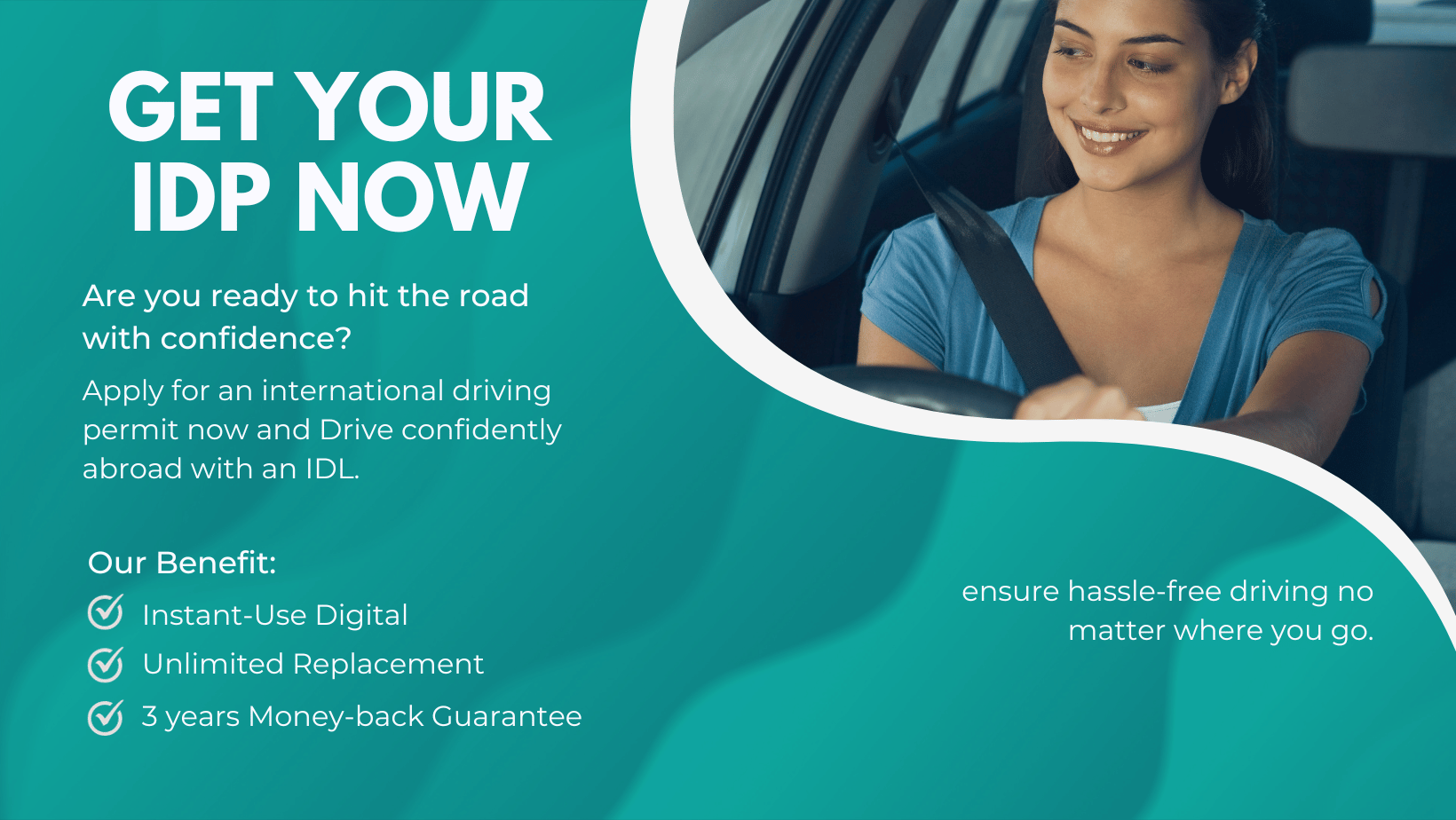
Anytime, anywhere, if you need a replacement IDP, we’ve got you covered.
Our IDP is your gateway to freedom on the roads in over 190 countries.
Explore with confidence; your UN- standardized document is globally accepted.
Our expert support team is available 24/7 via live chat to help you drive confidently.

International Driving Permit (IDP), regulated by the United Nations, certifies that you are the holder of a valid driver's license in your country of origin.
Your IDP is a valid form of identification in more than 150 countries worldwide and contains your name, photo and driver information in the 12 most widely spoken languages in the world.

International Driving Permit (IDP), regulated by the United Nations, certifies that you are the holder of a valid driver's license in your country of origin.
Your IDP is a valid form of identification in more than 150 countries worldwide and contains your name, photo and driver information in the 12 most widely spoken languages in the world.
Have your driver’s license and delivery
address handy
Upload pictures of your driver's license
Wait for confirmation and you’re ready to go!
Is an International Driving Permit required in France?
An International Driving Permit (IDP) is not required to drive in France if you have a valid European driving license. However, it is highly recommended, especially if you plan to travel to neighboring countries like Spain, Andorra, Monaco, or Italy, where an IDP might be necessary. The IDP serves as an official translation of your native driver's license and can be useful in overcoming language barriers. Some car rental companies in France may also require an IDP, so it's advisable to have one.
How to get an International Driving Permit for France?
Contrary to the mention of an "International Driving License," there is no authorized website or organization that issues such a license. Instead, what is commonly referred to as an International Driving Permit is essentially the official translation of your native driver's license. You can obtain it through specific channels, and the provided information about applying on a website, filling out an application form, uploading your valid driving license, and passport-sized photos seems inaccurate. It is essential to obtain accurate and official information from the relevant authorities.
Is a Native Driver's License Enough to Drive in France?
If you hold a valid European driving license, you can drive in France without the need to exchange it. Non-European licenses are also accepted, provided they have no restrictions or suspensions, and the issuing country is where you have lived for at least six months. The mention of translating your US license into French is misleading; typically, an IDP serves as a translation.
Most Important Driving Rules in France:
Driving Licence: As mentioned earlier, a valid European license or non-European license without restrictions is generally accepted.
Passport: It is advisable to carry identification documents, and they may be checked during police stops or by car rental companies.
Age Requirement: The minimum age for driving in France is 18.
Speed Limits: The national speed limit is 130 km/h. Speed limits vary in built-up areas and on main roads.
Seat Belts and Car Restraints: Seat belts are mandatory for both drivers and passengers.
Approach Warnings: Be aware of the unique light sequence of French traffic lights and adhere to their meanings.
Horns: Horns should be used judiciously, especially in built-up areas.
Right of Way: Vehicles drive on the right side of the road. Right of way is generally given to vehicles approaching from the right.
Overtaking: Overtaking is generally done on the left, but caution is advised.
Alcohol Influence: The blood alcohol level limit is 0.05% for private vehicle drivers.
Parking: Follow road signs for parking regulations, and parking illegally may result in fines and towing.
Tolls: Be aware of tolls on highways, and fees vary based on distance and vehicle type.
Fines and Confiscations: Serious violations can lead to fines and vehicle confiscation.
Breakdowns: In case of breakdowns, use emergency telephones along main roads for assistance.
Conditions Considered as "Dangerous Driving":
Dangerous driving includes driving while unfit, such as when injured, visually impaired, or mentally compromised. Falling asleep at the wheel is also considered dangerous driving and can lead to fines, license suspension, or imprisonment.
Police Stops and Checkpoints:
Random compliance checks are normal in France. During police stops, cooperate with authorities, present identification documents, and follow instructions. Compliance checks are routine, and tourists should not be overly anxious.
Car Accidents:
In case of a car accident, exchange insurance details, set up warning signals, and contact your insurance company promptly.
Top Destinations in France:
Paris: Visit iconic landmarks such as the Eiffel Tower, Louvre Museum, and Notre-Dame de Paris.
Lyon: Known as the "Capital of Lights," Lyon offers superb French cuisine and historic sites.
Bordeaux: Famous for wine production, Bordeaux also features neo-classical architecture and vibrant markets.
Nice: Enjoy the beautiful beaches and scenic views of the French Riviera in Nice.
Best Times to Visit:
Paris: June to August for longer days, or September to October for lower rates and shorter queues.
Lyon: May for comfortable weather, September to October for moderate weather, or November to April for budget deals.
Bordeaux: Springtime or December for festive atmospheres.
Nice: September to October and mid-March to April for favorable weather and lower room rates.
Worst Times to Visit:
Paris: June to August for crowded and expensive conditions.
Lyon: June to August for peak tourist season.
Bordeaux: September during harvest time.
Nice: May to August for peak season with higher rates and crowds.